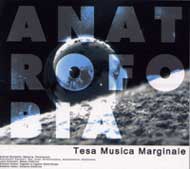Anatrofobia
Tesa
Musica Marginale
(Wallace)
For
a few years now, the name of this group has been inside the periphery of my
vision, but for some reasons - some of which can be attributed to chance,
while other were maybe not so random - I had never had the opportunity to
listen to their music. So when I put their new CD into my CD player I didn't
literally know what to expect.
I'm
glad I can say that I found the album to be pretty good, a pleasant surprise.
A quintet that's timbrally quite original, Anatrofobia feature saxophone,
bassoon (both acoustic and electrified), sampler, synths and electronics besides
the usual drums, bass and guitars. Recording and mixing are also by the group,
and they greatly prize function - though the whole presents a poetic dimension
(of the cold kind).
The
group has thought about what "composing" means - in its many different
ways. Sometimes it's quite easy to hear a written theme, while sometimes an
improvisation is witness to the confidence these musicians have with each
other.
Sax
and bassoon are the instruments one hears more easily, along with the electronics
and a drum set that could be said as sporting a kind of "dry, Dutch-like"
aesthetics. Not quite so apparent, at first, is the electric bass (but it's
the bass player who has written most of the music), while the electric guitar
works for the most part in an ensemble role. But it's the whole group that
functions quite well as a whole, avoiding empty virtuosity and facile, applause-ready
solutions.
The
five members have obviously listened to a lot of music, and learned a lot
in the process. Traces one hears are maybe those more familiar to the listener
- I heard echoes of Faust (some "stratified" synths), King Crimson
(some rhythmic solutions), Lounge Lizards (a typically "cool" melody),
even some Gong. Pure coincidence, maybe. But I also heard a strong affinity
for some film music that's easy to remember, but never banal - and sometimes
there's what we could define as a "Fellini-like" melancholia.
An
album that's as long as an old-time LP (thirty-eight minutes), that others
would have released as a double album: so many ideas, here, but absolutely
no fat. A whole that possesses its own logic, where the last piece (off Shostakovich)
gains value from its position.
Some
things will get better in the future - a certain use of dynamics (from piano
to VERY LOUD in a split second) is nowadays a bit too predictable as a compositional
tool, and anyway in the rock field Robert Fripp had exhausted its possibilities
by the time of Exposure (1979).
The
fact that a group can spend so much time and effort playing music so obviously
rigorous - and absolutely uncommercial - is pleasantly unusual. Hope to catch
the group live. Meanwhile, we already have Tesa Musica Marginale.
Beppe
Colli
©
Beppe Colli 2004
CloudsandClocks.net
| April 6, 2004











